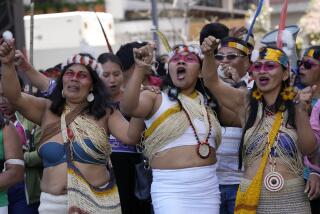Mediators Halt Talks on Peru-Ecuador Dispute : Latin America: Skirmishes between two countries’ forces continue. Negotiations are to start again in Brazilian capital.
- Share via
RIO DE JANEIRO — As Ecuador and Peru continued to fight over a disputed section of their border Sunday, mediators suspended peace talks here after failing to reach a cease-fire agreement in six days of negotiations.
Mediators from Brazil, the United States, Argentina and Chile have drafted a series of cease-fire proposals since the marathon talks began Tuesday, but no plan has received both Peruvian and Ecuadorean approval. Ecuador said Sunday that it needed more time to study the latest proposal.
Officials said negotiations will resume later in Brasilia, the Brazilian capital.
Ecuadorean President Sixto Duran Ballen began a whirlwind trip Sunday afternoon to Brazil, Argentina and Chile to explain his country’s position to the presidents of those countries. Peruvian President Alberto Fujimori flew over the border area, where Ecuador reported new attacks by Peruvian troops and helicopters.
“Peruvian attacks continue against the Ecuadorean posts and positions of Cueva de los Tayos, Base Sur and Coangos, against which the attackers used helicopter gunships,” an Ecuadorean military communique said. Those bases are in a disputed area of forested mountains where the border is unmarked.
The communique said that near another base, Tiwinza, Ecuadorean forces dispersed Peruvian “infiltrators” and that Ecuador remained in control of all of its bases.
“We are in those lands,” Jose Gallardo Roman, Ecuador’s defense minister, said Sunday night. “They haven’t been able to get us out.” But earlier Sunday, Fujimori told Peruvian reporters on his border tour, “Cueva de los Tayos has been taken, the invaders have been ejected from Base Sur, and at this moment Tiwinza is under assault.”
Ecuador, which claims that it has occupied its bases in the disputed area for years, has reported Peruvian attacks nearly every day since Jan. 26, with a total death toll of 10 Ecuadorean soldiers. Fujimori reported Sunday that 22 Peruvians have been killed or seriously injured.
Deputy foreign ministers from Ecuador and Peru and officials from the mediating countries have been sending draft documents to the belligerent governments for approval. Peru was ready to accept a draft agreement submitted Saturday, Fujimori said, but Ecuador was not.
When mediators emerged Sunday afternoon from the final session of the negotiations, their faces were lined with exhaustion and their words weighted by frustration.
“I would rather not think of this as a failure,” said Sebastiao do Rego Barros, Brazil’s deputy foreign minister. “We managed to reach important advances toward the signing of a cease-fire and a lasting peace.”
One of those advances, he said, was the acceptance by both nations of a mission of observers from the mediating countries to inspect the conflict zone. He declined to reveal other details but made it clear that the principal objectives of the talks--an immediate cease-fire and creation of a demilitarized zone--remain elusive.
Rego Barros said the talks were suspended chiefly because Ecuador requested more time to study the proposal. He said a “new stage” of negotiations will continue in Brasilia through normal diplomatic channels, because “it is not possible to keep such high-level officials away from their home base.”
Immediately after the end of talks, representatives from Peru and Ecuador announced their intention to continue negotiating in Brasilia but then proceeded to spar openly in separate statements to the media.
“What is happening is that at this moment Ecuador has not yet given an answer to the proposal,” said Eduardo Ponce, Peru’s deputy foreign minister. “Just maybe, God willing, at some moment Ecuador will give a positive reply.”
Marcelo Fernandez de Cordoba, Ponce’s Ecuadorean counterpart, said that his country had halted offensive action in the disputed border area but that Peru had not. Hostilities “will have to be suspended by those who engage in combat,” he said.
In the Ecuadorean capital, Quito, Communications Secretary Enrique Proano charged that Peru is trying to appear flexible in the negotiations “to make it appear that Ecuador has taken an intransigent position, and to justify the escalation of an armed aggression against a pacifist country.”
A statement from the Ecuadorean presidential palace said peace talks will continue today in Brasilia and that Fernandez de Cordoba will continue to participate.
In a surprise announcement, the statement also said that Duran Ballen left Quito on Sunday for meetings with Brazilian President Fernando Henrique Cardoso in Brasilia on Sunday night, Argentine President Carlos Menem in Buenos Aires at midday today and Chilean President Eduardo Frei in Santiago tonight.
Fujimori has also been lobbying his colleagues. A statement by his office Saturday said the Peruvian president had spoken by telephone with the presidents of Colombia, Bolivia, Argentina and Brazil, as well as with U.S. Secretary of State Warren Christopher.
According to press reports, Ecuador wanted an unconditional cease-fire and a demobilization of troops, but Peru refused, asking instead for the withdrawal of soldiers from a “demilitarized zone” five miles wide. Ecuador doesn’t want to leave any of its posts in the disputed area, apparently fearing that Peru will move in to claim them.
On Sunday, Fujimori said the Saturday proposal called for “first a cease-fire, second the return of troops from each country to their respective bases. That means Ecuadoreans to their bases and Peruvians to their bases in Peru.”
He said that formula “would be a triumph for Peru” because it would allow the demarcation of the disputed 50-mile section of border.
Special correspondent Margolis contributed from Rio de Janeiro and staff writer Long from Quito. Special correspondent Adriana von Hagen in Lima, Peru, also contributed.
More to Read
Sign up for Essential California
The most important California stories and recommendations in your inbox every morning.
You may occasionally receive promotional content from the Los Angeles Times.










